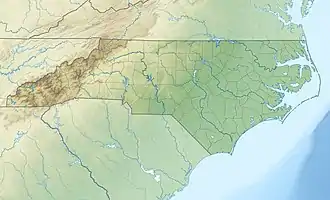Harrison Creek (Cape Fear River tributary)
Harrison Creek is a 12.84 mi (20.66 km) long 2nd order tributary to the Cape Fear River in Bladen County, North Carolina.
| Harrison Creek Tributary to Cape Fear River | |
|---|---|
 Location of Harrison Creek mouth  Harrison Creek (Cape Fear River tributary) (the United States) | |
| Location | |
| Country | United States |
| State | North Carolina |
| County | Bladen Cumberland |
| Physical characteristics | |
| Source | Harrison Creek Bay |
| • location | about 5 miles southeast of Cedar Creek, North Carolina |
| • coordinates | 34°54′40″N 078°41′55″W[1] |
| • elevation | 110 ft (34 m)[2] |
| Mouth | Cape Fear River |
• location | about 1.5 miles south of Burney, North Carolina |
• coordinates | 34°42′41″N 078°42′52″W[1] |
• elevation | 25 ft (7.6 m)[2] |
| Length | 12.84 mi (20.66 km)[3] |
| Basin size | 50.36 square miles (130.4 km2)[4] |
| Discharge | |
| • location | Cape Fear River |
| • average | 52.94 cu ft/s (1.499 m3/s) at mouth with Cape Fear River[4] |
| Basin features | |
| Progression | generally south |
| River system | Cape Fear River |
| Tributaries | |
| • left | Indian Creek |
| • right | unnamed tributaries |
| Bridges | Troy Fisher Road, Cedar Creek Road, Johnson Road, Privateer Farm Road, Camp Bowers Trail, River Road, Burney Road |
Course
Harrison Creek rises in Harrison Creek Bay, a Carolina Bay, about 5 miles southeast of Cedar Creek, North Carolina in Cumberland County. Harrison Creek then flows south into Bladen County to join the Cape Fear River about 1.5 miles south of Burney, North Carolina.[2] The course of Harrison Creek is hard to determine in swamps and with channelization of the stream.
Watershed
Harrison Creek drains 50.36 square miles (130.4 km2) of area, receives about 48.7 in/year of precipitation, has a wetness index of 620.10 and is about 17% forested.[4]
See also
References
- "GNIS Detail - Harrison Creek". geonames.usgs.gov. US Geological Survey. Retrieved 11 September 2020.
- "Harrison Creek Topo Map in Bladen". TopoZone. Locality, LLC. Retrieved 11 September 2020.
- "ArcGIS Web Application". epa.maps.arcgis.com. US EPA. Retrieved 11 September 2020.
- "Harrison Creek Watershed Report". US EPA Geoviewer. US EPA. Retrieved 11 September 2020.
This article is issued from Wikipedia. The text is licensed under Creative Commons - Attribution - Sharealike. Additional terms may apply for the media files.